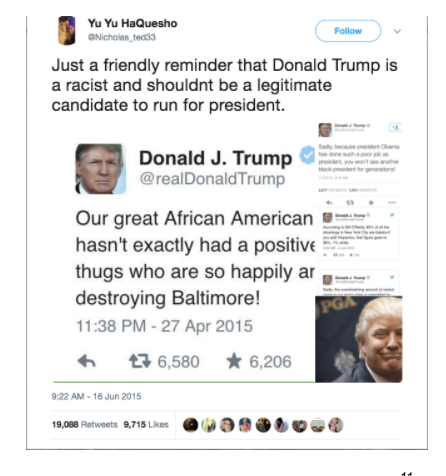Donald Trump announced his 2016 presidential candidacy on June 17, 2015 and was immediately met with opposition, both in the social media sphere and in real life.[9] People rallied against his candidacy due to the fact that he never held a public servant position as well as his xenophobic and other discriminatory messages. In Trump’s candidacy speech he used Anti-Mexican rhetoric, saying, “When Mexico sends its people, they’re not sending their best. They’re not sending you. They’re not sending you. They’re sending people that have lots of problems, and they’re bringing those problems with us. They’re bringing drugs. They’re bringing crime. They’re rapists.”[10]
Through Google Trends research, it is evident that there was not a strong organized online presence in opposition to Donald Trump prior to his candidacy announcement. Searches for trending topics such as “Anti-Donald Trump,” “Donald Trump,” and “Fuck Donald Trump” yield low search results prior to his candidacy announcement (in comparison to the Internet reaction to his winning the election on November 8, 2016).[8] Advanced Twitter and Facebook searches also show a minimal amount of posts to constitute a trend. From the research completed prior to his announcement for candidacy, there were not many online defining moments. Since then, the social media realm has protested many key points in Trump’s election campaign and in his first year as president.

